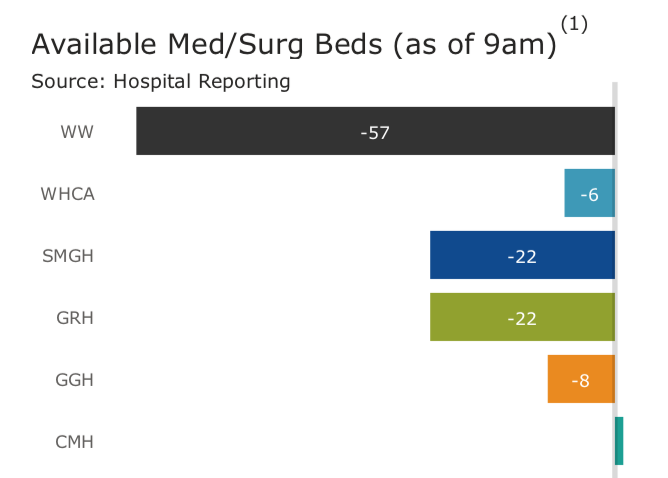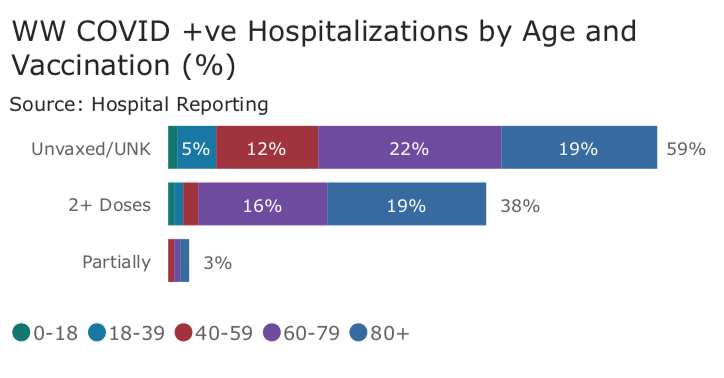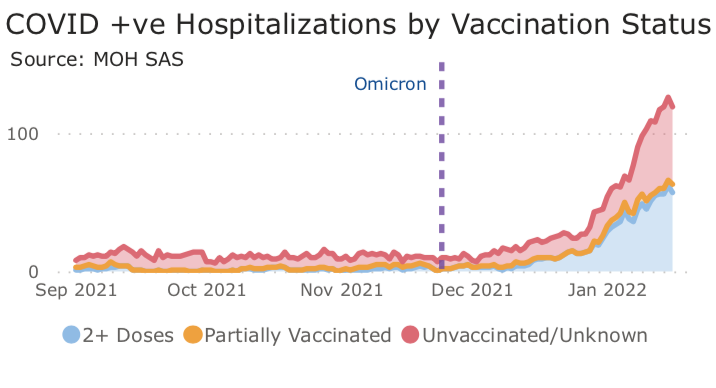WELLINGTON COUNTY – COVID-19 hospitalizations continue to rise in the Waterloo-Wellington area.
Meanwhile, the rate of staff COVID-19 absences at hospitals in Wellington County is about double the average for other hospitals in the area.
A Jan. 21 report from hospitals in the Waterloo-Wellington area shows 53 of 703 staff members are currently off sick with COVID-19 or in isolation from possible exposure between Groves Memorial Community Hospital, Palmerston and District Hospital and Louise Marshall Hospital in Mount Forest.
That figure has risen by 18% – from 45 to 53 – since Jan. 11.
The COVID absence rate at these Wellington Health Care Alliance (WHCA) hospitals, currently 7.5%, is higher than the rate at the Guelph, Kitchener and Cambridge hospitals included in the twice-weekly reports – and double the overall average for all hospitals.
Asked about the trend, Angela Stanley, president and CEO of the three Wellington hospitals, stated in an email, “The staff impacted by COVID-19 includes staff working on work self-isolation. This is a new addition to reporting today.”
COVID hospitalizations
Just four COVID-19 patients are hospitalized at the three Wellington County hospitals.
However, Stanley stated, “The number of patients reported with active COVID disease do not paint the whole picture.
“There are those who have recovered from COVID and those that have pending testing that may not be reflected in the numbers, however still require isolation and significant care.”
The number of patients with COVID-19 in hospitals – both in the Wellington-Dufferin-Guelph Public Health (WDGPH) region and the area covered by the Waterloo Wellington reports – has risen steadily over the last few weeks.
As of Jan. 21, there are 49 COVID hospitalizations in the WDGPH region, which includes the three Wellington hospitals as well as those in Orangeville and Guelph, with 12 in ICUs – both all-time highs.
Two weeks ago, there were 18 people with COVID-19 hospitalized in the WDGPH region, with two in ICUs.
“We are very full in our inpatient units and busy in our emergency departments,” Stanley told the Advertiser.
“We continue to experience impacts. We meet daily, sometimes twice, to identify new issues, strategize and put plans in place to ensure continued patient safety and flow.
“We have also been able to support our regional partners, accepting inpatient transfers from Guelph, Cambridge and Kitchener-Waterloo. The staff have been amazing and covering where needed.”
The increase in hospitalizations is mirrored at hospitals in the Waterloo region.
In the past week hospitalizations at Cambridge Memorial Hospital, Grand River Hospital and St. Mary’s General Hospital have increased 39%, from 125 on Jan. 14 to 174 on Jan. 21.
The increase “demonstrates that this region is on the ascent of the hospitalization curve this wave,” stated Lee Fairclough, president of St. Mary’s General Hospital and lead of the Waterloo Wellington hospital group.
“We appreciate the ongoing cooperation across our hospitals and with community providers to help each other cope day to day and create additional space to care for all patients in our community.
“As well, we remain grateful to our community who continue to do their part in supporting the current health measures in place. It helps to blunt the impact on our health system given what we are seeing in this region currently.”
Available beds
The Jan. 21 Waterloo Wellington hospital report also notes there are -57 medical/surgical beds available to support patients.
Wellington hospitals are showing a combined -6 beds available.

A Jan. 21 report shows a deficit of 57 beds in hospitals in Waterloo Wellington hospitals, including the three Wellington County hospitals (WHCA), St. Mary’s General Hospital (SMGH), Grand River Hospital (GRH), Guelph General Hospital (GGH), and Cambridge Memorial Hospital (CMH). (Waterloo Wellington COVID Report image)
Positive numbers suggest there are beds available to support patients, while a negative number means a hospital is full and supporting patients waiting for admission from the emergency department.
“This is not ideal for patients and does place added pressures on the emergency department,” Stanley said of the six-bed deficit at Wellington County hospitals.
“Our teams work across departments to support safe patient discharge of inpatients so that we can move these patients out of ED as soon as possible.”
The Waterloo-Wellington report notes that even though there are more patients than beds available, “anyone in need of emergency care is encouraged to still come to their closest hospital.”
It adds, “Our teams are working together as a system of care to identify spaces by opening non-traditional spaces across our hospitals.”
As for ICU beds, there are five available at Cambridge Memorial Hospital and just one each at Guelph General Hospital, Grand River Hospital and St. Mary’s General Hospital.
Since there are no ICU units in Wellington County hospitals, patients from the county requiring admission to an ICU are transferred elsewhere.
“It depends the patient’s care needs and the availability of beds,” Stanley noted.
“We work with our regional partners to try and keep patients closer to home but there are systems in place in Ontario to place patients in critical care where available.”
Vaccination status
The Waterloo Wellington report notes about 59% of those hospitalized with COVID-19 are unvaccinated or their vaccination status is unknown, while 38% have received two doses and 3% are partially vaccinated.
According to province-wide data from the Ontario Science Table, as of Jan. 20, the unvaccinated are twice as likely to test positive for COVID, five times more likely to require hospitalization and over 10 times more likely to end up in an ICU than those who have received at least two vaccine doses.

(Waterloo Wellington COVID Report image)




